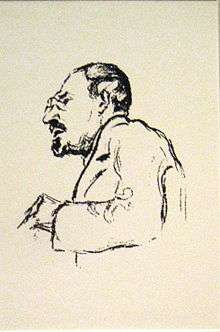Pavel Ryabushinsky
Pavel Pavlovich Ryabushinsky (Russian: Па́вел Па́влович Рябуши́нский) (17 June 1871, Moscow – 19 July 1924, Cambo-les-Bains), was a Russian entrepreneur and liberal politician.
Ryabushinsky | |
|---|---|
 Ryabushinsky by Yury Artsybushev | |
| Born | 17 June 1871 |
| Died | 19 July 1924 (aged 53) |
| Occupation | Russian politician |
Biography
Ryabushinsky was born into an Old Believer family that had prospered in the 19th century; like other scions of such merchant families, he had a good education (he spoke French, German, and English) and was anxious both to be accepted into high society and to improve his country. In 1907 he began publishing his own newspaper, Utro Rossii (The Morning of Russia), to propagate his liberal views. Rebuffed by the Constitutional Democrats, who did not want to be associated with the "narrow class interests" of industrialists, he and his fellow Old Believer Aleksandr Konovalov established contact with the "Right Kadets" associated with Peter Struve and began the Economic Discussions of 1909–12, "one of the few sustained collaborations between entrepreneurs and intellectuals in Russian history" (West, p. 46).
He was an active member of the irregular freemasonic lodge, the Grand Orient of Russia’s Peoples.[1] He and Konovalov founded the Progressist Party, which in 1915 became part of the Progressive Bloc; that same year he was elected Chairman of the Moscow Stock Exchange Committee and was appointed to head the Moscow War Industry Committee. This organisation exercised considerable autonomy from the Central War Industry Committee, negotiating contracts between entrepreneurs and the Military directly.[2] After the February Revolution he opposed the Soviet and the participation of socialists in the Provisional Government; following the failure of the Kornilov Affair, which he supported, he withdrew from politics and went to the Crimea for a tuberculosis cure. After the October Revolution he was accused of giving financial support to the All-Russian Teachers' Union, who had refused to continue to work under Bolshevik instruction.[3] He subsequently emigrated to France, where he continued to hope that he and his entrepreneurial class might eventually play a role in the development of his native country.
References
James L. West, "The Riabushinsky Circle" in E. W. Clowes, S. D. Kassow, J. L. West, ed., Between Tsar and People (Princeton UP, 1991), pp. 41–56.
- "Noteworthy members of the Grand Orient of France in Russia and the Supreme Council of the Grand Orient of Russia's People". Grand Lodge of British Columbia and Yukon. 15 October 2017.
- Peeling, Siobhan. "War Industry Committees". International Encyclopedia of the First World War. Freie Universität Berlin. Retrieved 14 August 2015.
- Fitzpatrick, Sheila (2002). The Commissariat of Enlightenment: Soviet Organization of Education and the Arts under Lunacharsky, October 1917-1921. Cambridge: Cambridge University Press. p. 34. ISBN 978-0-521-07919-8.